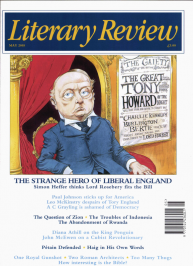Martyn Bedford
All Mixed Up
The Ballad of Lee Cotton
By Christopher Wilson
Little, Brown 320pp £14.99
This is one of those novels which is almost impossible to review without revealing at least some key elements of the plot. So, if you don’t want to know what happens, look away now. But, before you leave us, make sure you lay your hands on a copy of The Ballad of Lee Cotton. You’re unlikely to read a more effervescent, more uplifting, more original novel this year. Right, let’s get on with spoiling the story for you. Here it is, in a nutshell, in the hero’s own words: ‘I grew up a white black boy. Now I’m turning into a black white woman.’ In telling you the ‘what’ – the pitch, in Hollywood-speak – I’ll take care not to divulge too much of the ‘how’ and the ‘why’, because this is where the joy of Christopher Wilson’s novel resides, and where he marries ingenious premise to dazzling execution. And, of course, I wouldn’t dream of giving away the ending.
We join Lee Cotton’s tale at birth, cussed and screamed into existence by his mama, a mixed-race woman in a poor black district of semi-rural Mississippi. It’s the 1950s in the Deep South, and Klan law rules. Being born black ain’t so great. But Lee is born white, all superficial

Sign Up to our newsletter
Receive free articles, highlights from the archive, news, details of prizes, and much more.@Lit_Review
Follow Literary Review on Twitter
Twitter Feed
Alfred, Lord Tennyson is practically a byword for old-fashioned Victorian grandeur, rarely pictured without a cravat and a serious beard.
Seamus Perry tries to picture him as a younger man.
Seamus Perry - Before the Beard
Seamus Perry: Before the Beard - The Boundless Deep: Young Tennyson, Science, and the Crisis of Belief by Richard Holmes
literaryreview.co.uk
Novelist Muriel Spark had a tongue that could produce both sugar and poison. It’s no surprise, then, that her letters make for a brilliant read.
@claire_harman considers some of the most entertaining.
Claire Harman - Fighting Words
Claire Harman: Fighting Words - The Letters of Muriel Spark, Volume 1: 1944-1963 by Dan Gunn
literaryreview.co.uk
Of all the articles I’ve published in recent years, this is *by far* my favourite.
✍️ On childhood, memory, and the sea - for @Lit_Review :
https://literaryreview.co.uk/flotsam-and-jetsam